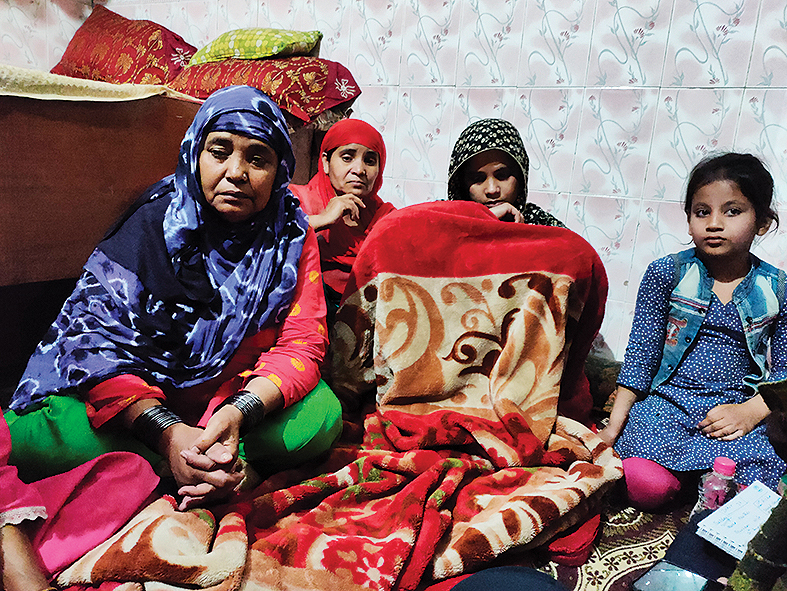The victims of the Delhi riots were no criminals, they were ordinary people going about their daily life. they were killed on their way back from work, others while coming back home after visiting their relatives, some who had gone out to buy milk, another who had gone shopping for a wedding; many were also targeted while on their way back from the masjid, while some even attacked at home.
At the time of writing this report, the confirmed death toll in the Delhi riots is 53. patriot spoke to a few of the families of the deceased, their pain superseding the hatred which led to their deaths. a report by Proma Chakraborty, Mayank Jain, Sashikala VP and Shaunak Ghosh.
“ABBU MAAR GAYE MERE”
A simple man of little wants, Zakir is fondly recalled by his neighbours and relatives at Mustafabad as a friendly man who never got into any trouble.
Zakir (27) is one of the many who lost their lives in the North-East Delhi violence. He left his house at 4pm on February 25, to check up on his elder brother in Brijpuri, and within two hours, news of his death reached his home. He had been stabbed to death.
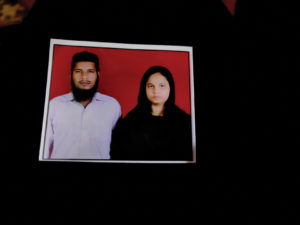
“I was offering my prayers, when a man came to our house and informed me that my son was lying in the hospital. I rushed to Meher hospital, and saw his body lying there. He was attacked by the mob and brought dead,” recalls Meena, Zakir’s mother fighting back tears.
Survived by his wife, Muskaan and two daughters — Aisha (7) and Afia (3), Zakir was the sole bread winner of the family.
“I have two daughters, and I don’t know what to tell them. It’s not just one day, its an entire lifetime. I don’t know how I will raise them now,” Muskaan says breaking down.
While Aisha realizes that her father is no more, Afia is too young to understand their loss. After the day her father passed away, Aisha cried out saying, “Abbu maar gaye mere. Allah ke pass chale gaye”.
Quite close to her father, Aisha would eagerly wait for Zakir to return from office regularly. “He would take time out to teach them. Sometimes they would be awake till 1am, learning together. They would practice writing in English, multiple times, till they got it perfect.
And now who will teach them?” questions Muskaan.
Muskaan takes out a photo of Zakir and for us to take a look. As they pass it along, they each take a look at him longingly as tears roll down their face. Aisha paused for a while, looking at her father’s photo and smiles.
Married for 10 years now, Muskaan is finding it difficult to imagine a life without him. “When our loved ones stay away from home even for a day, we keep checking up on them, calling them to ask if they have reached and eaten. And now he has gone to such a place that I can’t ask him
anything.”
Zakir would always stress on the need to educate her children and Muskaan hopes to fulfill his wish as well. “I want my children to be educated just like Zakir wanted them to be. Because if a person is educated they will never be a part of such riots. I will try my best to provide for their education.”
Muskaan recalls a time she had asked Zakir about the reasons behind the protests on CAA and NRC. “While he was not well aware of it, he wanted our children to be educated so that they understand our constitution.”
Working at a welding shop in Brijpuri, he would always greet everyone in the locality and never fought with anyone, adds a
neighbour.
Tired of the tense situation, Muskaan feels that the riots are illogical. “Hindustan has a lot of love in the country. Everyone is supposed to be safe them in this secular state. We cannot understand why this is happening now in this country? When will this fight end? Zindagi intni sasti kab se ho gayi hain?”
‘BRING BACK MY BROTHER’
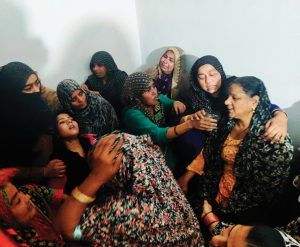
Every other lane in Mustafabad has been mourning the loss of loved ones for the past week, as more bodies keep coming in. On March 3, we were on our way to meet an injured woman at 4 pm, when we heard gut-wrenching cries from Gali no.6 of Old Mustafabad.
Men and woman had formed a crowd around a body wrapped in white. This time it was 19-year-old Aquib, who lost his life after battling for a week.
Aquib had gone out to buy clothes for himself at Bhajanpura on 24th February for his sister’s wedding. “The mob attacked him and he suffered injuries on his head due to stone pelting,” said Iqramuddin, Aquib’s father, as his relatives kept consoling him.
Aquib’s sister when his body was brought home to Mustafabad, from the mortuary
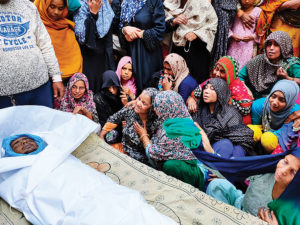
“Bring back my brother, Ammi,” Aquib’s inconsolable sister said, crying hysterically.
Admitted at the GTB hospital ICU, Aquib had undergone two operations. “The doctor said my brother was slowly recovering, but on March 2nd, they informed us that his heart has stopped functioning,” recalls his brother Waseem. Later that day, he was declared dead.
Aquib’s mother
“WE DO NOT KNOW WHAT TO DO NOW THAT HE IS GONE”
On the morning February 25, Prem Singh, an auto-rickshaw driver who lived in Brijpuri left his home to buy some milk for his three daughters. “We warned him not to go outside, knowing of the dangerous situation”, says Sunita, his wife. “He left home at around 9 am and till 4 pm there was no sign of him coming back. We even tried his phone but it was not reachable”, says Kamal, their landlady, who accompanied Sunita to the hospital.
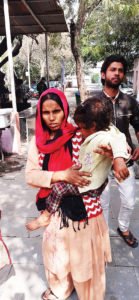
They then started looking for Singh, and at first, went to the garage where he used to keep his auto rickshaw. The other drivers present there said that he had not come there. After a few days, they went to the police station where they filed a missing report, as they went from pillar to post for the next few days in search of him.
Finally, they were called to the GTB hospital morgue by the police of February 29 to check the identity of an unidentified body they had found that day. As Sunita and her family reached the mortuary, they found out that her husband was no more.
On March 1, Sunita, Kamal along with a few other men from their colony in Brijpuri had come to collect his body. Sunita had her two-year-old daughter in tow, who couldn’t understand that her father had just passed away. She was also seven months pregnant with their fourth child.
“He was the sole earning member of our family, and we do not know what to do now that he is gone”, she says, her face bearing a stoic expression.
She also mentions that she doesn’t even have a bank account, and hence isn’t even sure of whether she would get the compensation money from the Delhi government. “Kuch jugaad karke ghar chala lungi”, she says when asked how she would feed her four children from now on.
A HOME LOSES TWO SONS
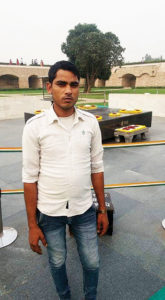
“I am unable to speak, my two children are gone, there cannot be a bigger loss than this”, Babu Khan tells us with his hand on his chest and tears in his eyes, as we visit his home in Old Mustafabad.
Khan’s two sons, 28-year-old Hashim and 17-year-old Amir, were killed by a mob on February 26, a day on which the unabated violence should have been contained. Instead, Khan says, while the “police said things were getting okay…even the news showed the same”, his boys became victims of communal hatred.
In fact, his two sons who had gone to visit their ailing grandmother had stayed back due to the riots, but had decided to come back because of increased police presence.

Just a few minutes away from home, Amir called home at 8:30 and said they would be reaching soon, but 5 minutes later his phone was switched off. His phone was later found on him, in his pocket, when his body was recovered.
Unaware of their deaths, Khan and his daughter reached the police station to file a complaint when they were shown pictures of three corpses. Two turned out to be his sons.
“I had to carry my sons on my back, whereas it should have been the other way around”, Khan said, breaking down. “Even animals will not be tortured the way they were”.
Their bodies were recovered from a drain with cuts all over their body, and head wounds, and according to their uncle (present when we met them), rioters had even attempted to burn them. The Apache bike they were travelling on was found burnt.
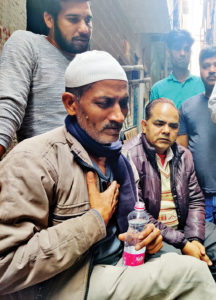
Asim used to work in a jeans manufacturing unit while Hashim was a driver. He was also a father to two young children.
“Just because we are uneducated they are doing this to us…they want to defame Muslims”, says Khan, adding that the hate had spread to such an extent that, “even if I go to a Hindu area they will perhaps kill me”.
GONE AT THE AGE OF 22
On that afternoon in March, the line of enquirers outside the GTB hospital mortuary grew longer and longer. Among them was Naseem Alam, who came in search of eldest son, 22-year- old Arshad. On the evening of February 26, Arshad, who had a small mobile repairing shop in DLF More in Seemapuri, went outside to see if his shop was damaged in the riots. This was despite multiple warnings from his parents not to go out in the midst of the tense situation all around North East Delhi.
But Arshad didn’t heed any of the warnings by his family and ventured out. He never returned. After four days of frantic searching in different hospitals and police stations, the search finally ended at the GTB hospital mortuary.
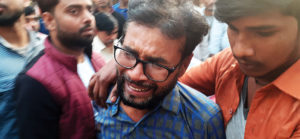
A police official who accompanied Naseem to the mortuary said that they had found an unidentified body from the nullah near Loni Border on the morning of February 27. “He came to our police station in Karawal Nagar, and when he gave the description of his missing son, I could spot similarities with the dead body we had found”.
As Naseem entered the mortuary, he hoped that the dead body would not be of his son’s, but that was not to be. After identifying the corpse as his son, he sat down on the road and started weeping uncontrollably. “He was my eldest, and the closest to me among my ten children”, he says, tears rolling down his eyes. “I had so many plans about his marriage, everything is shattered now. What will I do without him?” he questions.
A WEDDING AND A FUNERAL
Than Singh, a 50-year-old man hailing from a small village in Uttar Pradesh, came to Delhi time and again to get contracts for daily wage labour. On the night of February 25, he was supposed to work as a lamp holder in a wedding procession in Karawal Nagar. However, on his way to the wedding procession, he was attacked by a mob, who beat him up very badly.
His contractor took him to the emergency ward of GTB hospital. “The police, however, didn’t allow the contractor to stay at the hospital” says Sarvesh, niece of Than Singh. “They somehow admitted my uncle, but then shooed the contractor away and beat him up, saying that they could not let so many people inside the hospital”, she adds.
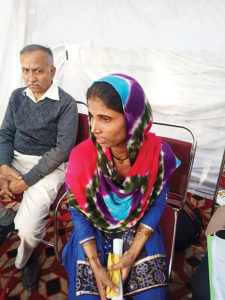
Sarvesh and her brother came to Delhi from their village somehow on February 29 and then continued the search for their uncle in the different buildings and wards of the GTB Hospital, with the mortuary being their final stop. They did find him in the end, but what greeted them was a two-day-old corpse of Singh in the mortuary. “He has injuries all over his body, and the morgue doctor said that he succumbed to the injury on the back of his skull”, says Sarvesh, crying profusely.
“He was such a jovial man, always used to crack jokes. We had lost our father when we were young, and it was he who had raised us”, continues Sarvesh. “It feels as if someone has swept the ground away from beneath our feet”.
DESTROYED IN SECONDS
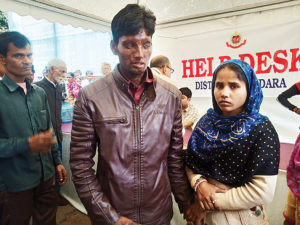
Mohammed Anwar Qasir, 58-year-old man was at his home alone, when a mob chanting religious slogans barged into his home. They entered his home when Qasir was alone there. The goons first shot him dead, locked him from inside and burnt the whole house down.
The rage of the fire was such that nothing inside the house remained intact. Even the pet goats were charred. Qasir’s body had completely burnt down, with his left leg being the only part that survived the fire.
That the leg was Qasir’s was confirmed through a DNA test of his daughter, Gulshan, conducted by the doctors at GTB hospital
Nasiruddin, Qasim’s son-in-law had lost his eyesight five years ago, as he was involved in a freak accident in the acid workshop he used to work in. Hence, his whole fsamily, which includes Gulshan, Qasir’s daughter, and their two children- totally depended on Qasir’s earnings.
A YOUNG LIFE SNUFFED OUT
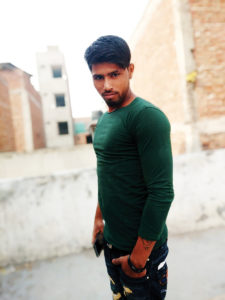
Just 23 years old, Shahid Alvi did not come home after his visit to a dargah on February 24th. His family came to know of his demise from gunshot wounds through pictures of his body, which had been taken to Medina nursing home.
He was reportedly shot near the Mohan Nursing Home which was also the epicentre of the riots. With most of his family members having left for their village Bulandshahr in Uttar Pradesh with Shahid’s body, we spoke to his brother-in-law Salim.
Salim told us that his family came to know of his death through photos of his body which were circulating on social media. He had gotten married to Saziya, just three months back and she is now pregnant with their child.
The young man who drove an auto for a living, was identified at the nursing home and taken to GTB hospital, from where his body was brought home after three days.
‘SHOT BY THE POLICE’
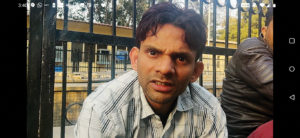
Majid Ali’s elder brother Mahroof Ali died on, February 25, while guarding his street in the Hindu-dominated Bhajanpura around 10:30 that night.
Ali says his brother was shot while they tried to keep a mob out of their area along with their Hindu neighbours. “People in police uniform came and started firing. I told my brother to come to the side”, but we was shot.
Mahroof became unconscious, “there was blood everywhere” says Majid. Mahroof, 32, was declared brought dead at 12:10 am at LNJP hospital. He leaves behind his wife and two children, a 9-year-old daughter and a 6-year-old son.
SHATTERED DREAMS
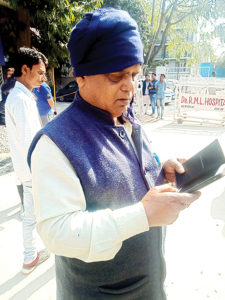
21- year- old, Aftab from UP’s Bijnore came to Delhi on 20th February, a class XI student and aspiring doctor, used to work in a shop that makes parts of cooler at Shiv Vihar. His father Mohammed Umar, who came to take his dead body from RLM hospital, said, “Aftab was missing since 25th and we were looking for him, then we filed a police complain on 1st march.” Aftab’s family visited GTB hospital four times but couldn’t find his trace.
When they were informed that police found four bodies on Sunday — three from Gokulpuri drain and one from Karawal Nagar and brought to Dr. Ram Manohar Lohia hospital. They rushed to the hospital and identified him. Aftab was youngest among six brothers
SHOT FOR NO REASON
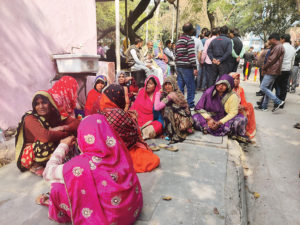
Rahul Solanki, a 26-year-old from Babu Nagar, died from gunshot wounds. His family members were at GTB hospital waiting for his body when we met him.
Just a few metres away from home, the engineer was found by a mob who shot him dead when he stepped out to buy milk. His work colleagues stood outside the mortuary crying, unable to come to terms with their friend’s demise.
Solanki’s father, Hari Singh Solanki, like other victims’ families have blamed Kapil Mishra and his speech for ruining their home.
‘MY BROTHER HAD HINDU FRIENDS’
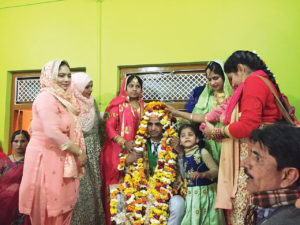
Mudassir spoke fondly, remembering his brother and all the time they had spent together. The newly married Ashfaque, just 22 years old was shot on the evening of the 25th while walking home from work in Mustafabad.
Ashfaque worked as an electrician and was returning home when a mob shot him, Mudassir, heartbroken asked, “What have these people spoilt that they did this to us”?
When we last spoke to Mudassir he had said that he intended to get justice for his brother at the Delhi High Court.
“He is my brother, we stayed together 24 hours. He had just recently started working”, he tells us. He doesn’t understand the hatred, “He had Hindu friends…we all lived together happily”.
SOLE BREAD EARNER GONE
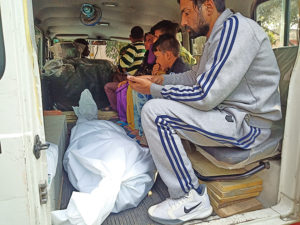
Aquil, a resident of Mustafabad Gali No. 4 used to work as a helper in a car cleaning workshop. He went out for some work that day, but did not come back on the 25th . His family and relatives kept looking for him until they came to GTB hospital and identified his dead body, three day later.
He is survived by his wife and two kids. The eldest son has quit his studies after fifth standard. Aquil was the sole bread earner of the family, and now they have no one to take care of them. He was killed by a mob near Bhagirath Vihar nallah, a kilometre or so away from his home.

